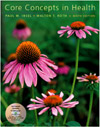

 Core Concepts in Health, 9/e The Use and Abuse of Psychoactive Drugs Chapter 9 The Use and Abuse of Psychoactive Drugs |
 2002 McGraw-Hill Higher Education
2002 McGraw-Hill Higher EducationAny use is subject to the Terms of Use and Privacy Policy.
McGraw-Hill Higher Education is one of the many fine businesses of The McGraw-Hill Companies.